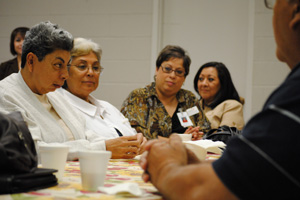A Heart for Healing

Promotores in the West Texas Community Health Workers Network recently met to discuss how to strengthen the program to better serve their communities.
Edward Olivarez has spent more than five years educating the West Texas Hispanic community about diabetes.
Olivarez, a Lubbock resident who himself struggles with the chronic disease, said he knows first-hand why it is important for people with diabetes to manage their diet, medication and lifestyle.
Sharing Knowledge, Spreading Hope
By enrolling in a course to become one of 35 certified community health workers, or promotores, in the West Texas Community Health Workers Network, Olivarez became equipped with the skills he needed to pass valuable health advice and guidance to underserved residents who may not otherwise seek health care.
“[By becoming a promotor] I found myself because I really enjoy helping people,” Olivarez said.
Emma Hernandez, of Lubbock, became a promotora after she lost her husband to diabetes. She said she enjoys educating people about medication guidelines and disease management because she believes empowering people with knowledge about their diseases gives them hope.
“Being a diabetic is not the end of the world,” Hernandez said. “It’s just a new era.”
Bridging the Gaps
Promotores in the West Texas Community Health Workers Network have more than 10 years of evidence-based experience acting as bridges between community members and health care professionals to provide health care referrals, needs assessment and education about breast cancer, congestive heart failure, obesity, diabetes, hypertension and asthma.
“In any way we can, we motivate [our clients] to make healthy changes in their lifestyles,” said Promotora Mary Paul.
Leading a healthier lifestyle is important when combating many chronic diseases because they’re often connected, said Yondell Masten, Ph.D., R.N., interim dean of the School of Nursing. And promotores play a pivotal role in helping their clients focus on disease prevention and consequences.
But clients of promotores aren’t the only ones motivated by the program to change their lives.
Leticia Barron said not only has becoming a promotora enabled her to support her community, it has also given her confidence and a sense of purpose.
“This class is awesome,” Barron said. “So what if I just have a high school education. That doesn’t have anything to do with it. I have that heart that corazón to go out there and do it.”
Strength in Numbers
Debra Flores, M.A., promotora project director and instructor in the Anita Thigpen Perry School of Nursing, said she is proud of how much the promotora movement in West Texas has grown, and looks forward to strengthening the program by gaining more state support to hire additional community health worker instructors to produce more promotores for the West Texas region.
“The demand is growing for these types of jobs,” Flores said. “We’re very proud that we’re spreading into the rural communities because we realize the need is there.”
Related Stories
Celebrating Veterans: TTUHSC’s General Martin Clay’s Legacy of Service and Leadership
From his initial enlistment in the Army National Guard 36 years ago to his leadership in military and civilian health care management roles, Major General Martin Clay’s career has been shaped by adaptability, mission focus and service to others.
Texas Tech University Health Sciences Center School of Nursing Named Best Accelerated Bachelor of Science in Nursing Program in Texas
The TTUHSC School of Nursing Accelerated Bachelor of Science in Nursing (BSN) program has been ranked the No. 1 accelerated nursing program in Texas by RegisteredNursing.org.
TTUHSC Names New Regional Dean for the School of Nursing
Louise Rice, DNP, RN, has been named regional dean of the TTUHSC School of Nursing on the Amarillo campus.
Recent Stories
The John Wayne Cancer Foundation Surgical Oncology Fellowship Program at Texas Tech University Health Sciences Center Announced
TTUHSC is collaborating with the John Wayne Cancer Foundation and has established the Big Cure Endowment, which supports the university’s efforts to reduce cancer incidence and increase survivability of people in rural and underserved areas.
TTUHSC Receives $1 Million Gift from Amarillo National Bank to Expand and Enhance Pediatric Care in the Panhandle
TTUHSC School of Medicine leaders accepted a $1 million philanthropic gift from Amarillo National Bank on Tuesday (Feb. 10), marking a transformational investment in pediatric care for the Texas Panhandle.
Texas Tech University Health Sciences Center Permian Basin Announces Pediatric Residency Program Gift
TTUHSC Permian Basin, along with the Permian Strategic Partnership and the Scharbauer Foundation, Feb. 5 announced a gift that will fund a new pediatric residency.
